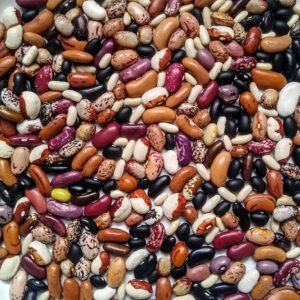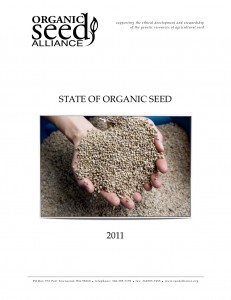
 Organic Seed Alliance has spent nearly two years making a roadmap for organic seed systems, and we’re proud to announce its publication, titled State of Organic Seed. This roadmap was led by former OSA staff member, Matthew Dillon, and supported by diverse stakeholders who believe that improving, protecting, and promoting organic seed is fundamental to the success of organic farmers and the food system they supply. State of Organic Seed was officially released at last month’s Organicology conference, and serves as the first comprehensive analysis of the challenges and opportunities in building the organic seed sector.
Organic Seed Alliance has spent nearly two years making a roadmap for organic seed systems, and we’re proud to announce its publication, titled State of Organic Seed. This roadmap was led by former OSA staff member, Matthew Dillon, and supported by diverse stakeholders who believe that improving, protecting, and promoting organic seed is fundamental to the success of organic farmers and the food system they supply. State of Organic Seed was officially released at last month’s Organicology conference, and serves as the first comprehensive analysis of the challenges and opportunities in building the organic seed sector.
First, the good news: our research shows that organic seed systems are developing, as farmers report increased attempts to source organic seed and more pressure from certifiers to do so. And public research in organic plant breeding has increased slightly, with investments from both the public and private sector.
Still, challenges and needs loom large for expanding organic seed systems.
Developing seed systems that respond to the diverse needs of organic farmers will take new investment and increased public-private collaboration. There is a pressing need to reinvigorate public plant breeding with an emphasis on varieties that fit the agronomic, environmental, and market needs of organic farming. Fortunately, our research also shows that organic farmers want to be part of the solution – many are interested in working with professional breeders to speed the development of regionally adapted organic varieties by conducting on-farm breeding and trials.
Policy changes are also a priority. Steps must be taken to encourage organic seed usage and provide better information to farmers and certifiers regarding seed availability. And recommendations aimed at protecting organic seed integrity in the face of genetically engineered (GE) crops couldn’t be timelier.
In the aftermath of the U.S. Department of Agriculture’s recent decision to deregulate both genetically engineered (GE) alfalfa and sugar beets, organic seed advocates continue to ask: “What can I do?” We provided some ideas (see “Ten Ways to Respond to USDA’s GE Alfalfa and Sugar Beet Decisions” and our GE alfalfa and sugar beet talking points) and continue to work with partner organizations on multiple strategies for achieving fair farming policy.
As we react to these decisions with disapproval – as we must – let us simultaneously elevate the benefits of organic seed systems in our dialogue: systems that build soil health, enhance flavor and nutrition of food, protect biological diversity, are resilient in the face of climate change, and honor farmers’ roles and rights. And remember that seed sovereignty can begin in your backyard.
The stakeholders involved in State of Organic Seed agree that building organic seed systems demands comprehensive, collaborative approaches, and that no solution can move forward independently. This month, OSA launched four working groups to carry out preliminary action items identified in the report – policy, research, education, and market-driven activities that will result in the improved quality, integrity, and use of organic seed. Follow our progress by bookmarking our Seed Broadcast blog and following us on Facebook and Twitter.
An organic food future – one that feeds more people with fewer negative impacts while providing greater stability and success for family farms – is possible only if we protect and improve our organic seed. State of Organic Seed is a living document, an ongoing project to monitor our progress. Looking forward, your input and ongoing support is critical to making an organic food future a reality.
